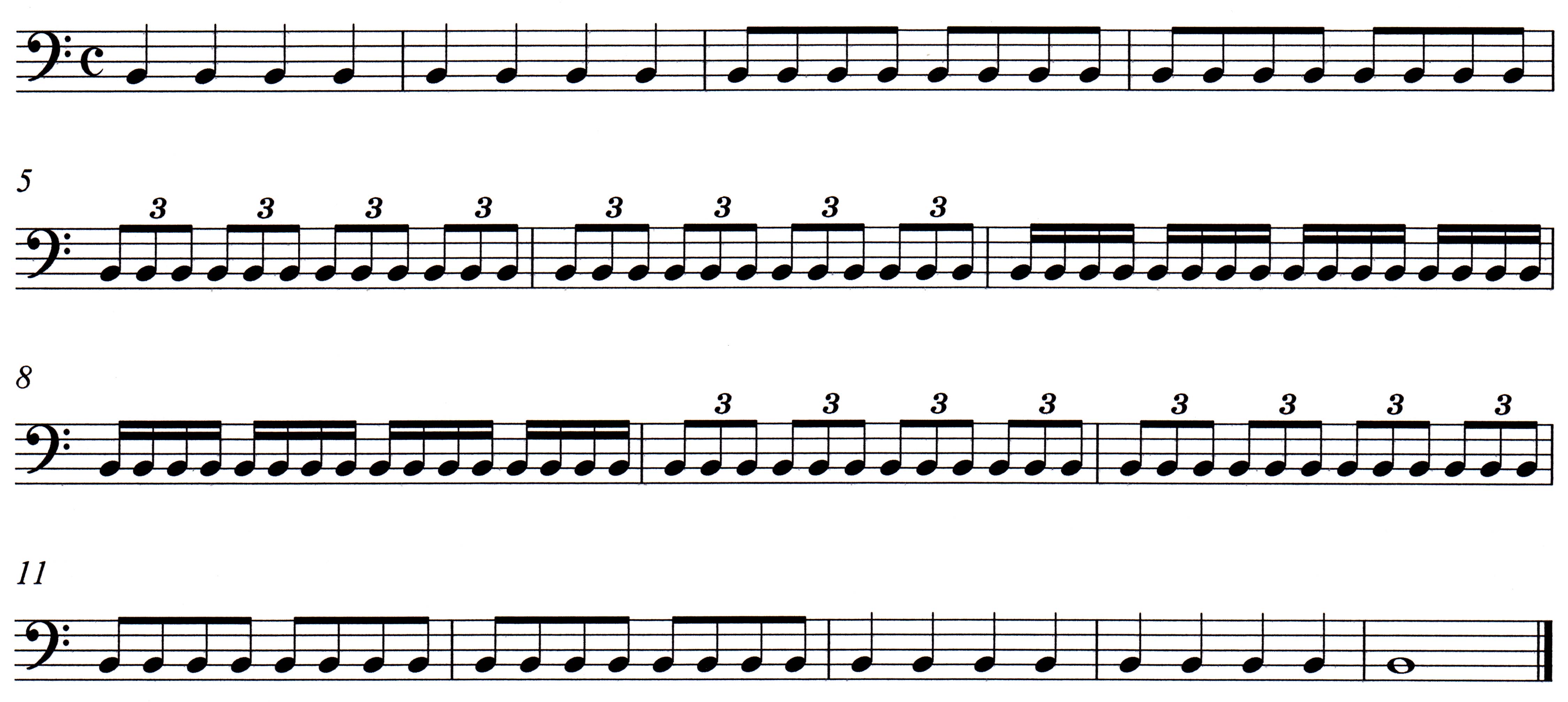
The Bass is part of the Rhythm Section. You may know this, you may not. Regardless, it is important to understand the reality that it is part of the Bass player's
responsibility to help establish and maintain a steady beat or groove, in concert and co-operation with the drummer and/or percussion section. Together, they
represent the foundation upon which a performance will be built.
So it is therefore essential that all musicians must work with a metronome during personal practice time.
You should be able to play at a variety of tempos with equal facility and ability, understanding the push-pull nature in the "feel" of the different styles of music
you will be playing. And you should be capable of playing quarter notes, eighths, triplets, sixteenths, and even thirty-second notes, when required.
A great exercise you can do is to play through at least to sixteenth notes, switching from one to another grouping with ease and smooth transitions. The following
graphic lays out a good routine to use in checking your ability to play through each value. The tempo you begin with should be slower than you believe you are able.
Why? The simple fact is that you must be able to play at slower tempos as much as at faster tempos. Slow tempos are a greater challenge because they require you to
be more accurate in note placement.

Begin by setting your metronome at 60 beats per minute (bpm). Yes, it's slow; that's the point. And, if it's too fast for the sixteenths, slow it down until you are able to play cleanly even these notes. Once mastered - and I do mean mastered - only then move up just 2 to 4 bpm and repeat. Only after you are confident and cleanly playing at each tempo should you advance the speed.
You do not want to trivialize this aspect of your playing. Believe me. There is nothing worse than a Rhythm section that can't keep a steady beat. I have fired people for this, I have had to play with people who couldn't keep good time. It's one of the worst experiences you'll ever have.
True Story: I was working a session with a band. After they had laid down the tracks, the core of it live in the studio, we set about mixing down the songs. As we "solo'd" each track and instrument to make corrective EQ decisions, we soon came to the Bass track. As soon as the song started, with the Bass up in the mix, it was instantly clear there was a big problem. The Bass player couldn't play on the beat. He played everywhere around it, only incidentally actually hitting the beat itself. Unfortunately, the band had no more money to re-record the Bass tracks. By employing some creative EQ and blending of instruments, we were able to mask the problem from the average listener. Any musician would still have heard the problem.
If you have not yet been a part of a serious band, you have no idea how important this really is. If you have been in a serious musical effort, you can attest to the need for everyone to work with a metronome. Everyone needs to understand how critical it is to the syncopation, the Funk, the R&B groove, the laid back Blues feel, the Pop drive, the heavy back beat, the swinging jiving big band sound.
One of my favourite applications for the metronome is the fact that it can be used for more than simply counting off the beat.
For example, to perfect the eighth note groove, set the metronome to click off every eighth note. So if the tempo is 84, set the metronome to 168, double the tempo. It is now clicking off the eighth notes. Your task will be to nail each eighth right on the money.
You can do this with triplets, sixteenths; you can even have the metronome click off the 1 & 3 of a measure, or the 2 & 4 (back beat) of a measure, to help you with those musical expressions.
The metronome is a powerful tool you need in your daily practice routine. You should play everything with a metronome, not necessarily all the time, but frequently and regularly with all material you know, all scales, runs or other elements of your playing to help improve technique, timing and general sense of time.
As you employ the metronome in your practice time, you will begin to notice a marked difference in your playing time with every other musician or band you perform with.
And that can only make you a better player, a more desirable commodity in the music community, and an example of what good practice habits can accomplish.
Who wouldn't want that?
Now, go find your metronome...or buy one and get poppin'!
Next time!